Embarking on a journey through the annals of Major League Baseball (MLB) history invites us into a world where legends tread, where the crack of a bat and the roar of a crowd encapsulate moments of sheer human endeavor and triumph.
This exploration is not merely about unearthing the statistical giants of the game or recounting their most celebrated feats; it’s a deeper dive into the essence of what makes a player truly legendary. As we delve into the careers and legacies of the top 10 MLB players of all time, we are drawn into stories that transcend the boundaries of the baseball diamond, revealing characters who have not only achieved extraordinary athletic feats but have also left an indelible mark on the culture and spirit of the sport.
These athletes, from the towering figures of Babe Ruth and Hank Aaron to the indomitable spirit of Lou Gehrig, represent the pinnacle of baseball excellence. Their journeys, marked by both unparalleled success and profound challenges, offer a window into the heart of America’s pastime.
This narrative seeks to honor their contributions, not just as players who mastered their craft but as icons who shaped the very fabric of the game and its place within American society. Through their triumphs and trials, we discover the true essence of greatness, both on the field and beyond, in the storied history of Major League Baseball.
The Top 10 MLB Players of All Time
1. Babe Ruth
2. Willie Mays
3. Hank Aaron
4. Ted Williams
5. Barry Bonds
6. Ty Cobb
7. Mickey Mantle
8. Stan Musial
9. Rogers Hornsby
10. Lou Gehrig
This list encompasses players who excelled in various aspects of the game—hitting, fielding, and base running—while also transforming the sport through their presence and prowess.
1. Babe Ruth
Babe Ruth, born George Herman Ruth Jr. on February 6, 1895, is often hailed as the greatest baseball player of all time. His career, spanning 22 seasons in Major League Baseball, was marked by unprecedented feats that reshaped the sport’s landscape. Ruth’s journey from a troubled youth in Baltimore to a baseball icon is a testament to his enduring legacy and the transformative power of sports.
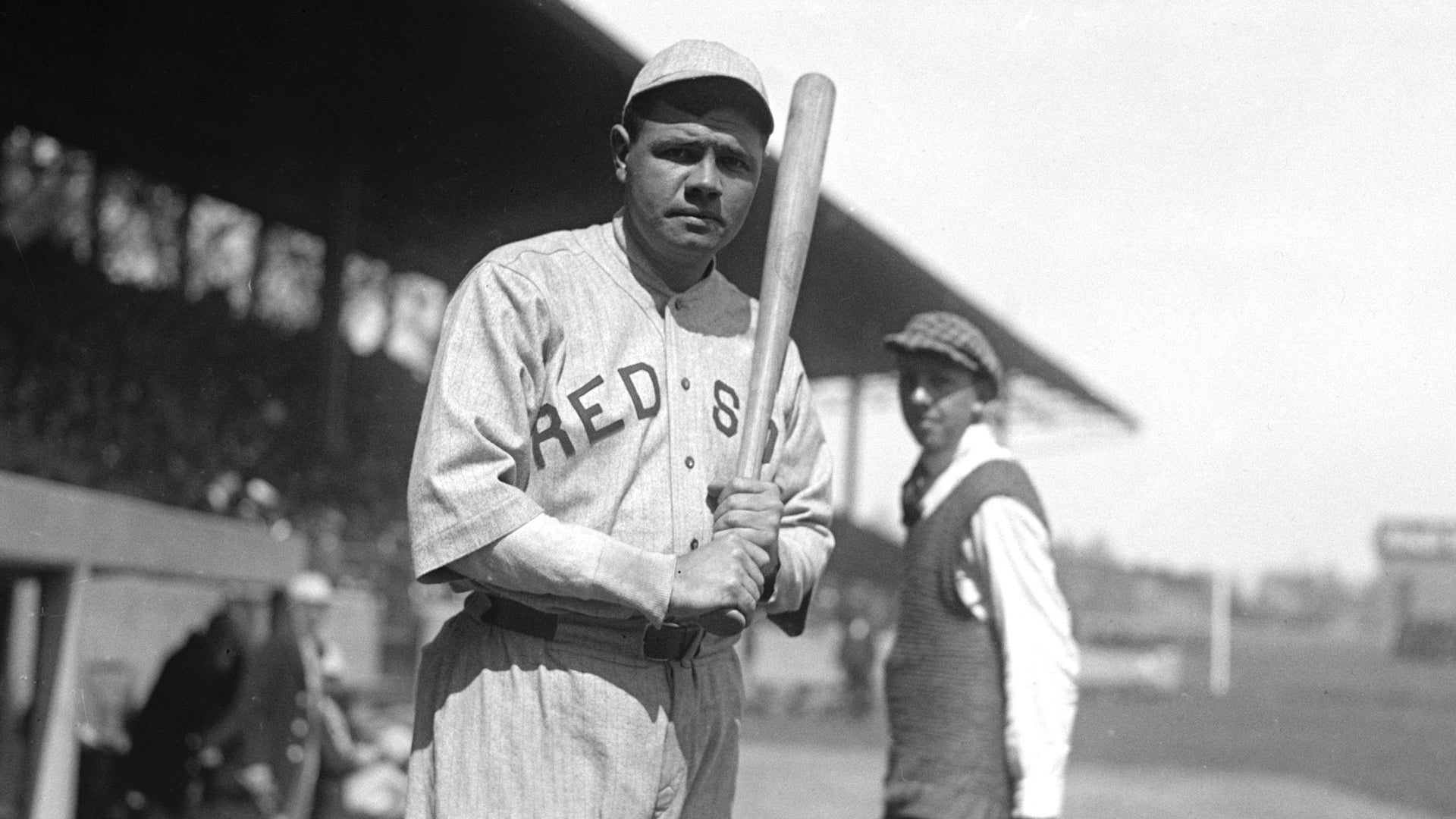
Ruth’s impact on the game was multifaceted; he was a dominant pitcher for the Boston Red Sox before transitioning to an outfielder with the New York Yankees, where he achieved most of his fame. His prowess at the plate was legendary, setting records for home runs (714), RBIs (2,213), and slugging percentage (.690) that stood for decades. Ruth’s ability to draw crowds and his charismatic personality played a pivotal role in popularizing baseball, earning him the moniker “The Sultan of Swat.”
Beyond his statistical achievements, Ruth’s influence extended off the field. He was a larger-than-life figure whose appetite for life matched his baseball talents. Ruth’s charitable work, particularly with children, endeared him to fans and demonstrated the potential of athletes to impact society positively. His legacy is not just in the records he set but in the hope and joy he brought to millions during his career and beyond.

This analysis merely scratches the surface of Babe Ruth’s monumental impact on baseball and American culture. His story is one of triumph, transformation, and the timeless appeal of a hero who transcended the sport to become a cultural icon.
2. Willie Mays
Willie Mays, affectionately known as “The Say Hey Kid,” represents the quintessence of a five-tool player in Major League Baseball, possessing unmatched skills in hitting, hitting for power, running, fielding, and throwing. Born on May 6, 1931, in Westfield, Alabama, Mays’s career spanned over 22 seasons, primarily with the New York and San Francisco Giants, leaving an indelible mark on the game through his phenomenal talent and joyous approach to playing.
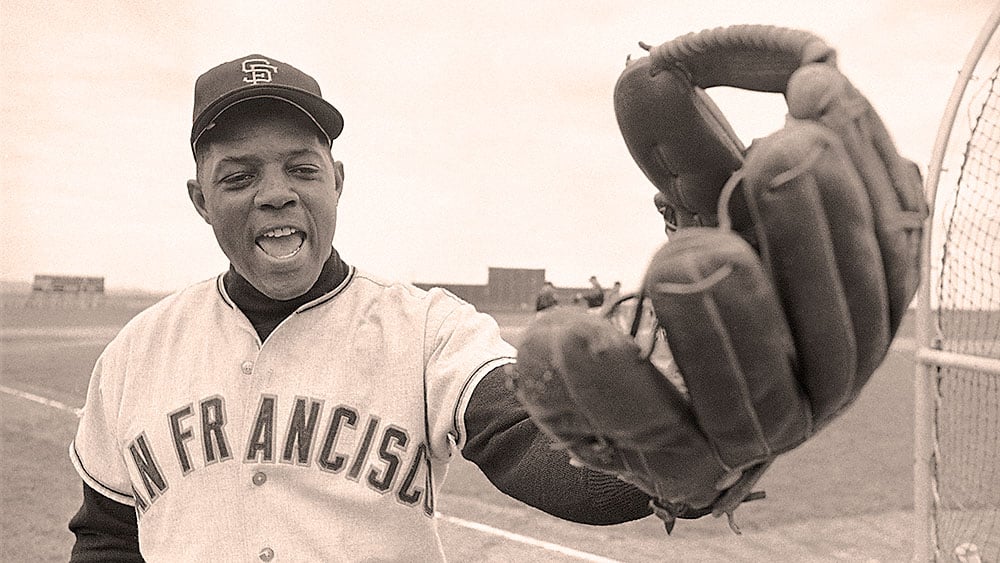
Mays’s contributions to baseball are monumental, accumulating 660 home runs (5th all-time), over 3,000 hits, and 12 Gold Glove Awards, showcasing his defensive prowess. His most iconic moment, “The Catch,” during the 1954 World Series, epitomizes his defensive genius and remains a defining image of his career. Beyond his statistical achievements, Mays’s energetic playing style, characterized by his basket catches and powerful arm, revolutionized outfield defense.
His impact extended beyond the field, as Mays was a trailblazer for African American athletes, navigating the challenges of racial integration in baseball with dignity and resilience. Mays’s charisma and the joy he displayed playing the game made him a beloved figure among fans and a role model for future generations of players.

Mays’s legacy is not merely encapsulated by his statistics or the accolades he received, including two MVP awards and 24 All-Star selections, but also by his contribution to the game’s integrity and the inspiration he provided to countless individuals. Willie Mays is not just a baseball legend; he is an enduring symbol of excellence and joy in the pursuit of one’s passion, making him a quintessential figure in the sport’s history.
3. Hank Aaron
Hank Aaron, known as “Hammerin’ Hank,” stands as one of the most storied figures in Major League Baseball history, not only for his unparalleled achievements on the field but also for his grace and resilience it. Born on February 5, 1934, in Mobile, Alabama, Aaron’s journey through the major leagues was a testament to his relentless pursuit of excellence and his unwavering dignity in the face of adversity.
Aaron’s baseball career, primarily with the Milwaukee and Atlanta Braves, spanned 23 seasons, during which he broke numerous records, the most notable being Babe Ruth’s all-time home run record. Aaron finished his career with 755 home runs, a record that stood for over three decades. However, his impact transcends mere numbers. He amassed more than 3,000 hits, maintained a batting average over .300, and earned 25 All-Star selections, highlighting his consistent excellence and versatility as a player.
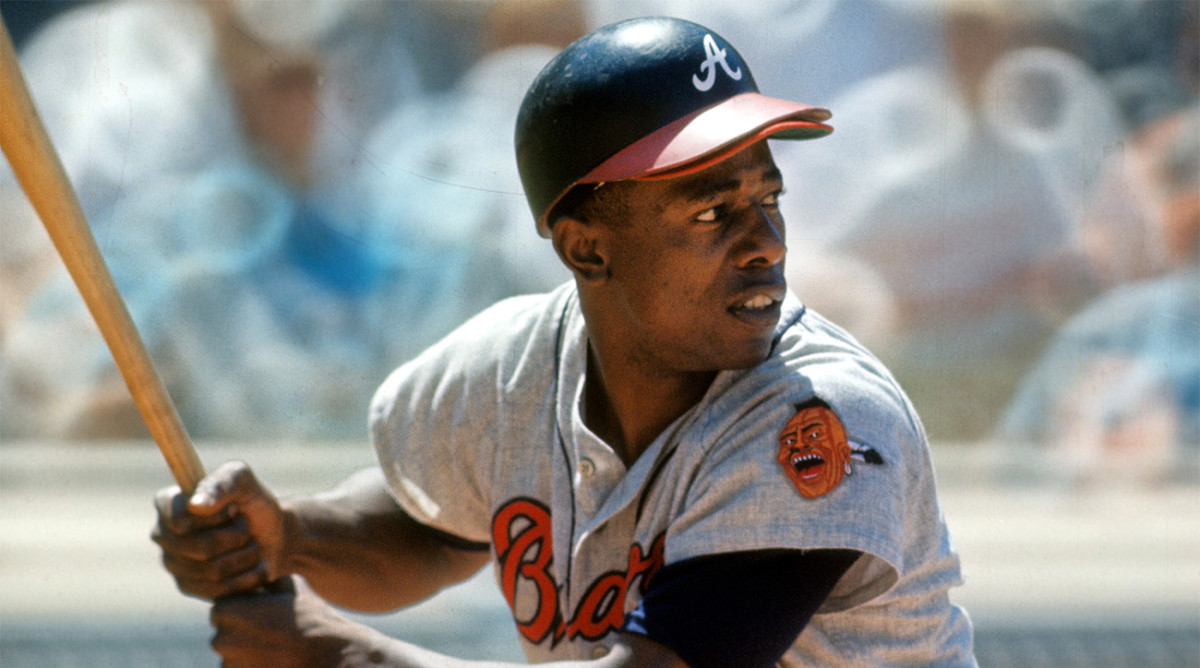
Beyond his statistical achievements, Aaron’s chase for the home run record occurred amid intense racial animosity and threats against his life. His strength in facing these challenges head-on, with dignity and resolve, endeared him to fans and solidified his legacy as a pioneer for civil rights and racial equality within sports.
Aaron’s contributions off the field were equally significant. His philanthropic efforts, particularly in promoting education and opportunities for underprivileged youth, demonstrated his commitment to using his platform for social change. Aaron’s legacy is not merely that of a baseball legend; he is a cultural icon who exemplified the power of sports as a vehicle for societal progress.

Hank Aaron’s story is one of triumph over adversity, excellence achieved through perseverance, and the profound impact an athlete can have on society. His legacy serves as an enduring inspiration, reminding us of the values of integrity, resilience, and the pursuit of excellence.
4. Ted Williams
Ted Williams, often hailed as “The Greatest Hitter Who Ever Lived,” stands as a monumental figure in the annals of Major League Baseball, transcending mere statistics to embody the essence of batting perfection.
Born on August 30, 1918, in San Diego, California, Williams’s career with the Boston Red Sox spanned from 1939 to 1960, interrupted only by his service as a fighter pilot in World War II and the Korean War. This hiatus, which claimed five prime years of his career, only adds to the mystique of what he might have achieved had he played uninterrupted.
Williams’s approach to hitting was both scientific and artistic. He finished his career with a .344 batting average, 521 home runs, and a .482 on-base percentage, the highest of all time. His meticulous study of pitchers and an obsessive dedication to perfecting his swing led to his achieving the Triple Crown twice, a feat that underscores his dominance in batting average, home runs, and runs batted in (RBIs) within a single season.
Beyond his statistics, Williams’s legacy is also defined by his passionate pursuit of excellence and his complex relationship with fans and the media. His commitment to hitting was paralleled by his commitment to serving his country, demonstrating a depth of character and dedication that extended far beyond the baseball diamond.
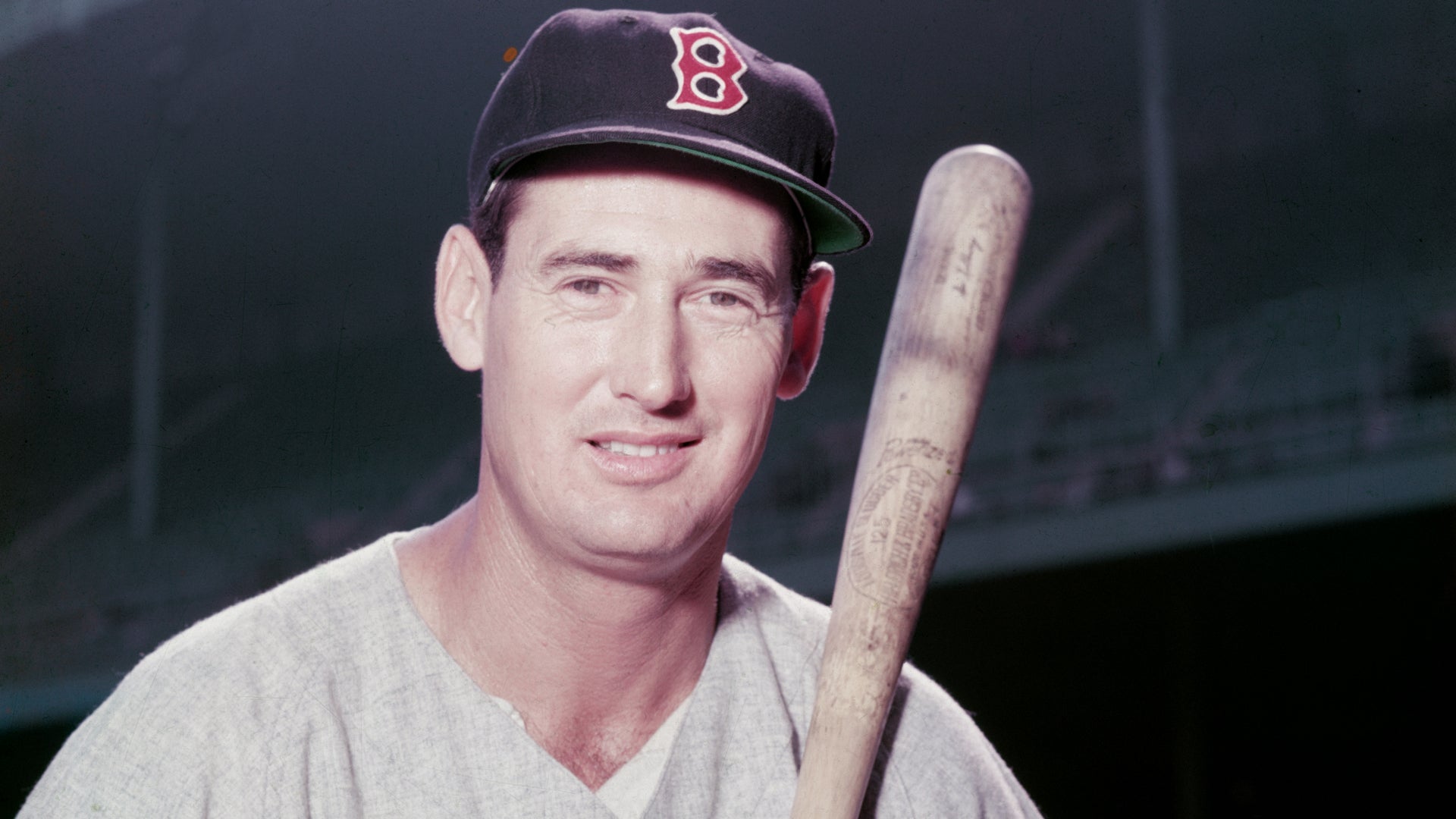
One of Williams’s most enduring contributions to baseball is his book, “The Science of Hitting,” which remains a seminal work on batting technique and philosophy. Through this work, Williams shared his insights and theories on hitting, influencing generations of players and fans alike. His analytical approach to hitting, focusing on factors such as pitch selection and the mechanics of the swing, revolutionized the way players thought about and approached batting.
Williams’s humanitarian efforts, particularly his advocacy for the Jimmy Fund, a charity supporting cancer research and treatment, further exemplify his character. His dedication to philanthropy, often conducted away from the public eye, revealed a compassionate side to the fierce competitor.
Ted Williams’s induction into the Baseball Hall of Fame in 1966 was a testament to his extraordinary career and impact on baseball. His famous speech, advocating for the inclusion of Negro League players in the Hall of Fame, demonstrated his respect for the game’s history and his commitment to justice and equality.

Ted Williams’s story is one of unparalleled skill, unwavering dedication, and profound influence on the sport of baseball. His pursuit of excellence in hitting, combined with his contributions to his country and community, cements his legacy as one of the most revered figures in baseball history. Williams’s life and career offer a blueprint for achieving greatness, not only in sports but in all endeavors, through dedication, discipline, and a deep love for one’s craft.
5. Barry Bonds
Barry Bonds is a figure whose career is as legendary as it is controversial, embodying the complexities of modern baseball. Born on July 24, 1964, in Riverside, California, Bonds’s career spanned 22 seasons in Major League Baseball, playing for the Pittsburgh Pirates and San Francisco Giants. His record-breaking achievements on the field have made him one of the most dominant players in the history of the sport, yet his association with baseball’s steroid era has cast a shadow over his legacy.
Bonds’s statistical accomplishments are unparalleled. He holds the records for home runs in a career (762) and a single season (73), set in 2001. Beyond the home runs, Bonds was a model of consistency and excellence, achieving seven MVP awards, 14 All-Star selections, and eight Gold Gloves. His ability to combine power with precision made him a fearsome presence at the plate, reflected in his .298 career batting average, .444 on-base percentage, and .607 slugging percentage.
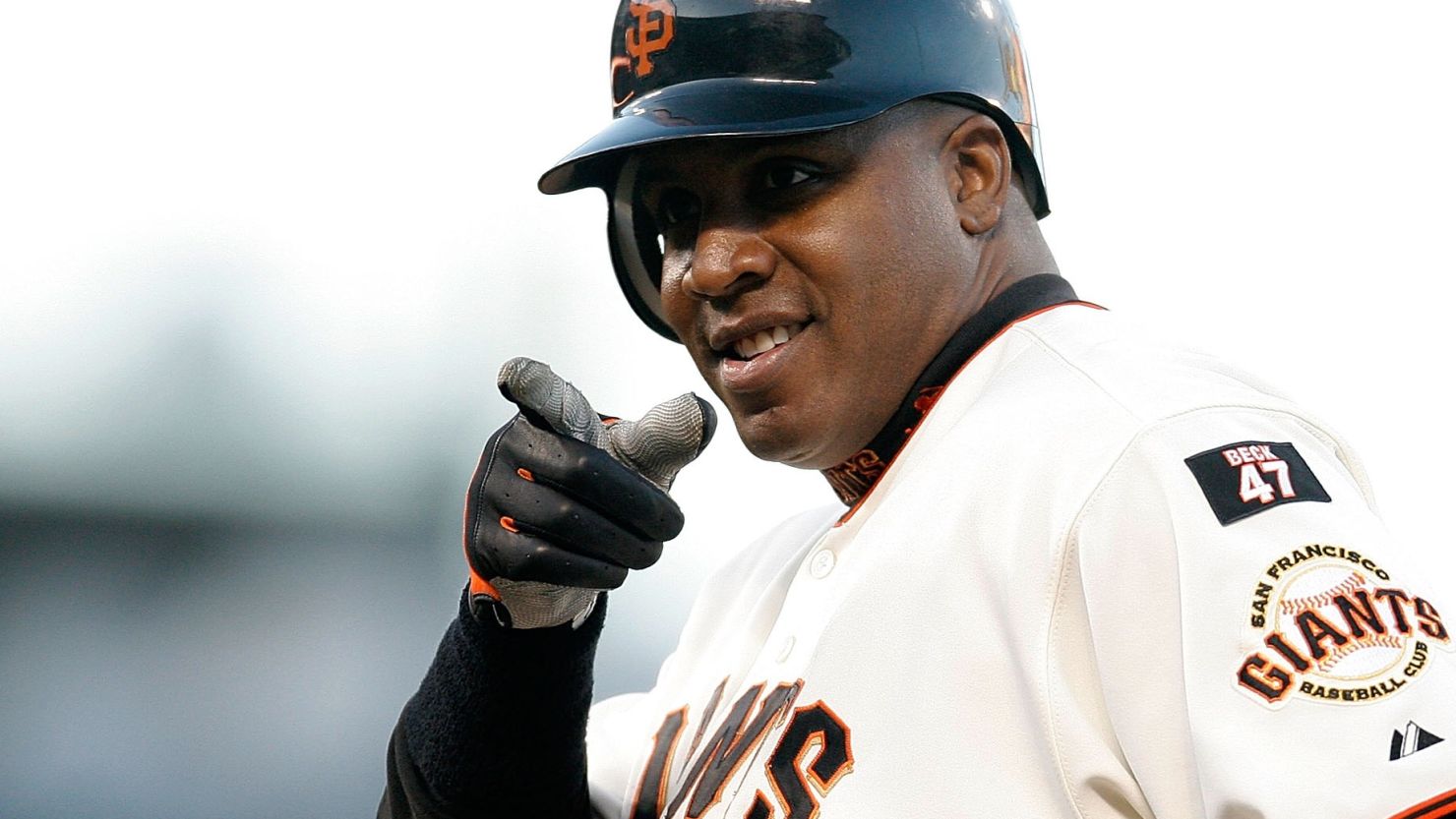
However, Bonds’s career is often viewed through the prism of the steroid allegations that emerged in the early 2000s. Despite never failing a drug test, his connections to the BALCO scandal and significant physical changes over his career led to widespread speculation about performance-enhancing drug use. This controversy has significantly impacted Bond’s legacy and has been a key factor in his exclusion from the Baseball Hall of Fame thus far.
Despite the controversy, Bonds’s impact on the game cannot be overstated. His approach to hitting, characterized by exceptional plate discipline and power, revolutionized offensive strategies in baseball. Bonds was not just a power hitter; he was an intelligent player who understood the nuances of the game, making him one of the most strategic hitters in baseball history.

Barry Bonds remains a polarizing figure in the world of baseball, embodying both the heights of athletic achievement and the complexities of the sport’s relationship with performance-enhancing substances. His legacy is a reminder of the era in which he played, marked by incredible feats on the field and significant controversies off it. Bonds’s story is a complex chapter in baseball history, reflecting the challenges and changes the sport has faced in the modern era.
6. Ty Cobb
Ty Cobb, nicknamed “The Georgia Peach,” is one of the most iconic figures in baseball history, renowned for his fierce competitiveness, incredible hitting skills, and complex personality. Born on December 18, 1886, in Narrows, Georgia, Cobb’s career in Major League Baseball, primarily with the Detroit Tigers, spanned 24 seasons from 1905 to 1928. His approach to the game and his astounding statistical achievements set the standards for excellence in the early years of professional baseball.
Cobb’s batting prowess is legendary; he retired with a career batting average of .366, the highest in MLB history. He led the American League in batting average twelve times and amassed 4,189 hits, second only to Pete Rose at the time of his retirement. Beyond his hitting, Cobb’s aggressive base running changed the way the game was played, as he stole 897 bases over his career, a record that stood for nearly 50 years.
However, Cobb’s on-field brilliance was often overshadowed by his aggressive demeanor and controversial actions. Known for his fiery temper and relentless desire to win, Cobb’s competitive nature sometimes crossed the lines of sportsmanship, leading to numerous incidents on and off the field. Despite these controversies, Cobb’s influence on the game is undeniable, as he brought a level of intensity and determination that helped popularize baseball across the United States.
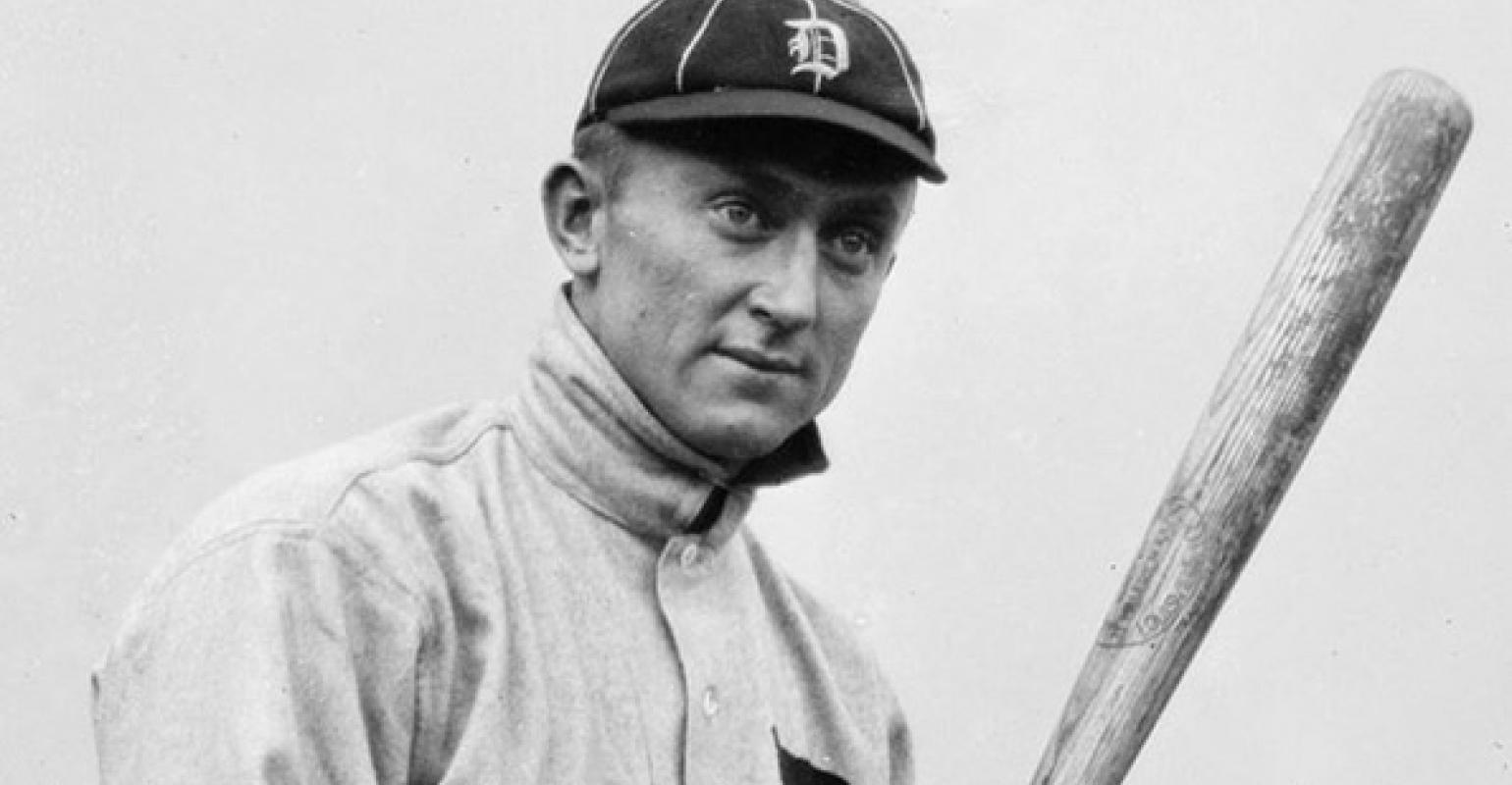
Beyond his contributions on the field, Cobb’s legacy is also marked by his contributions to the game after his retirement. He was known for his investments in Coca-Cola and General Motors, becoming one of the first athletes to achieve significant financial success through savvy investments. Cobb also contributed to various charities and educational initiatives, demonstrating a complex personality that contrasted with his fiercely competitive nature.
Ty Cobb’s legacy in baseball is multifaceted. As one of the inaugural inductees into the Baseball Hall of Fame in 1936, his incredible achievements and the way he revolutionized the sport are undisputed. Yet, his career also prompts reflection on the complexities of competition, sportsmanship, and the human elements that intertwine with athletic greatness.

With the exploration of Ty Cobb’s storied career and intricate persona, we’ve delved into the legacies of individuals who not only excelled in their athletic endeavors but also shaped the fabric of Major League Baseball through their unique contributions and personalities.
7. Mickey Mantle
Mickey Mantle, an iconic figure in the pantheon of Major League Baseball, remains one of the most beloved and complex athletes of the 20th century. Born on October 20, 1931, in Spavinaw, Oklahoma, Mantle’s career with the New York Yankees spanned 18 seasons, from 1951 to 1968. Known for his incredible power from both sides of the plate, his speed, and his ability to play through pain, Mantle’s legacy is a blend of mythic sports heroism and human vulnerability.
Mantle’s contributions to baseball were immense. He hit 536 home runs, won three Most Valuable Player (MVP) awards, and was selected to 20 All-Star games. Perhaps his most remarkable statistic, however, is his performance in the postseason. Mantle appeared in 12 World Series, winning seven of them, and holds records for the most World Series home runs (18), RBIs (40), runs (42), walks (43), and extra-base hits (26). These achievements underscore his ability to perform at his best when the stakes were highest.
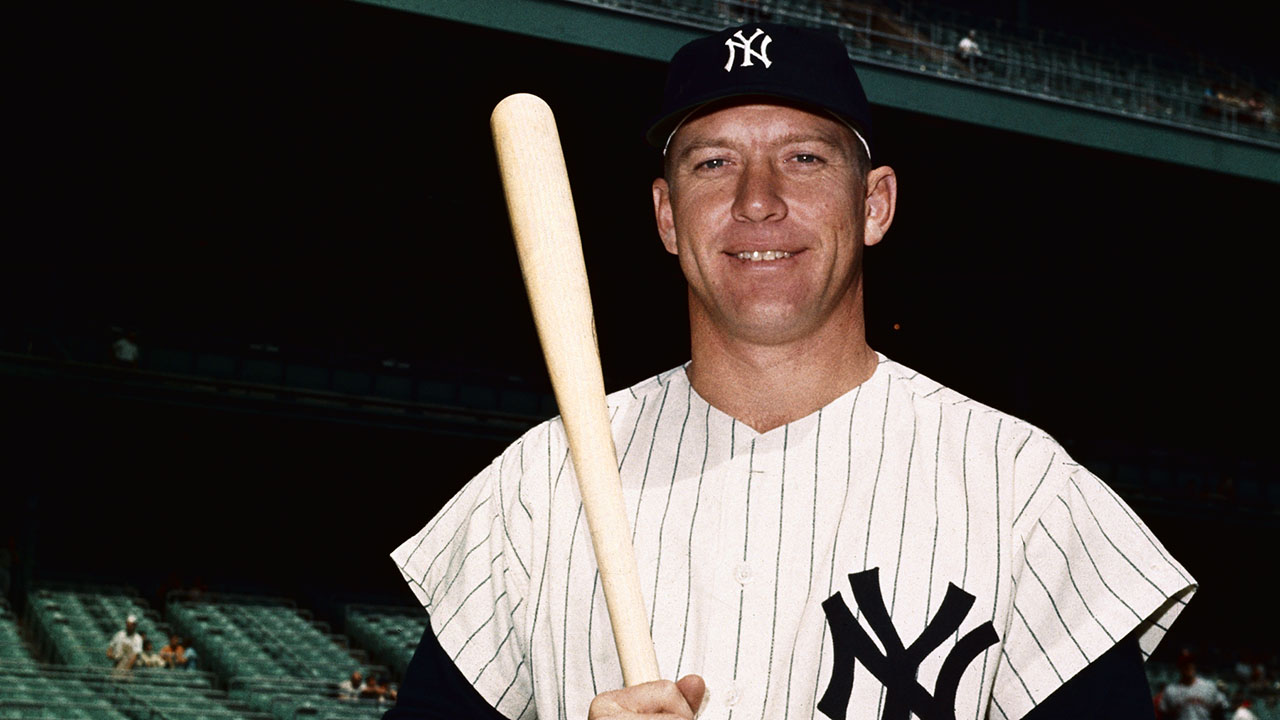
Beyond the numbers, Mantle’s impact on baseball and American culture was profound. He represented the hopes and dreams of a post-war generation, embodying the era’s mix of innocence and burgeoning complexity. His persona as a down-to-earth, approachable superstar endeared him to fans, even as his career and personal life were marked by injuries and struggles with alcoholism. Mantle’s openness about his faults and battles later in life humanized him to the public and contributed to his enduring legacy.
Mantle’s speed and power were legendary, earning him the Triple Crown in 1956 when he led the American League in batting average, home runs, and RBIs. His switch-hitting prowess added a layer of strategic advantage for the Yankees and set a standard for future generations. Despite suffering numerous injuries, his resilience and determination to play through pain exemplified the spirit of baseball and the ethos of mid-20th century America.

Mantle’s legacy is also a story of what might have been. Injuries, particularly a devastating knee injury early in his career, likely robbed him of even greater achievements. Despite this, his career is a testament to his talent, determination, and capacity to inspire through both performance and personal vulnerability.
8. Stan Musial
Stan Musial, known affectionately as “Stan the Man,” is one of baseball’s greatest ambassadors, whose career is as remarkable for its consistency and sportsmanship as it is for its extraordinary achievements. Born on November 21, 1920, in Donora, Pennsylvania, Musial’s tenure in Major League Baseball, entirely with the St. Louis Cardinals from 1941 to 1963, is a testament to his enduring excellence and the profound impact on the game and its fans.
Musial’s career statistics are a marvel of longevity and consistent performance. He amassed 3,630 hits (ranking 4th all-time), a .331 career batting average, and 475 home runs. His 24 All-Star Game selections (a record he shares with Willie Mays and Hank Aaron) underscore his status as a perennial star. Musial won three National League (NL) MVP awards and finished second in MVP voting four additional times, highlighting his sustained excellence over two decades.
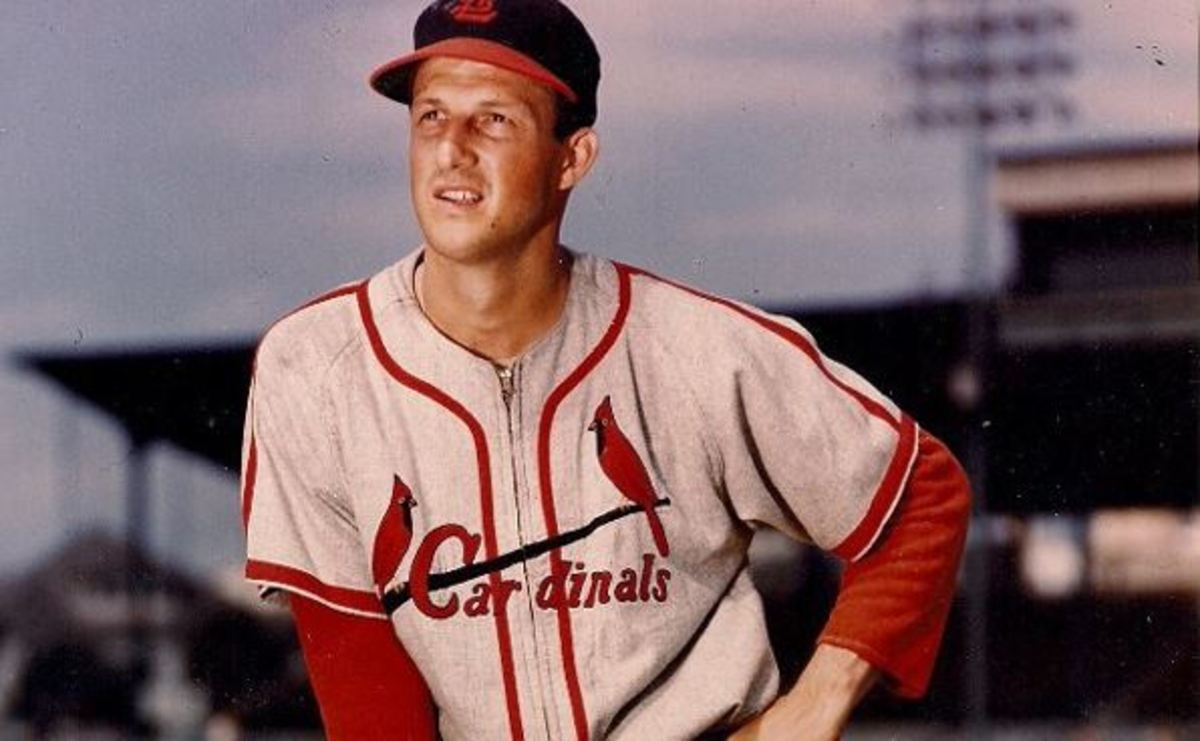
Beyond the numbers, Musial’s legacy is defined by his character and the respect he garnered both on and off the field. Known for his gentlemanly conduct, Musial was a model of integrity, sportsmanship, and consistency. He was beloved by fans, respected by opponents, and admired by teammates, embodying the ideals of what a professional athlete should be.
Musial’s impact extended beyond the baseball diamond. He served in the Navy during World War II, missing the 1945 season, yet returned to baseball without missing a beat, demonstrating his resilience and commitment to both his country and his sport. Off the field, Musial was an active philanthropist and advocate for baseball, contributing to his community in St. Louis and promoting the game he loved throughout his life.

“Stan the Man” was not just a nickname but a recognition of Musial’s standing as one of the game’s greats and as a person of exceptional character. His harmonica playing, friendly demeanor, and signature stance at the plate are fondly remembered by those who witnessed his career and those who continue to celebrate his legacy.
9. Rogers Hornsby
Rogers Hornsby, known as “The Rajah,” remains one of the most formidable hitters in the history of Major League Baseball. Born on April 27, 1896, in Winters, Texas, Hornsby’s career spanned from 1915 to 1937, during which he established himself as one of the greatest right-handed hitters the game has ever seen. Playing primarily for the St. Louis Cardinals, Hornsby also had stints with the New York Giants, Boston Braves, Chicago Cubs, and St. Louis Browns, leaving a lasting impact at each stop.
Hornsby’s batting achievements are almost mythical. He boasts a career batting average of .358, the second-highest in MLB history behind Ty Cobb. Hornsby led the National League in batting average seven times, including a staggering .424 in 1924, a mark that remains the highest single-season batting average in modern baseball history. Beyond his average, Hornsby was a prolific power hitter, leading the league in home runs and RBIs multiple times, and capturing the Triple Crown twice, a feat achieved by only two other players in the 20th century.
Beyond his accolades, Hornsby’s influence on the game was profound. His intense focus on hitting, studying pitchers, and understanding the nuances of batting technique made him a formidable presence at the plate and a respected figure among peers and rivals alike. Hornsby’s approach to hitting, characterized by meticulous preparation and an unwavering belief in his method, set a standard for future generations of hitters.
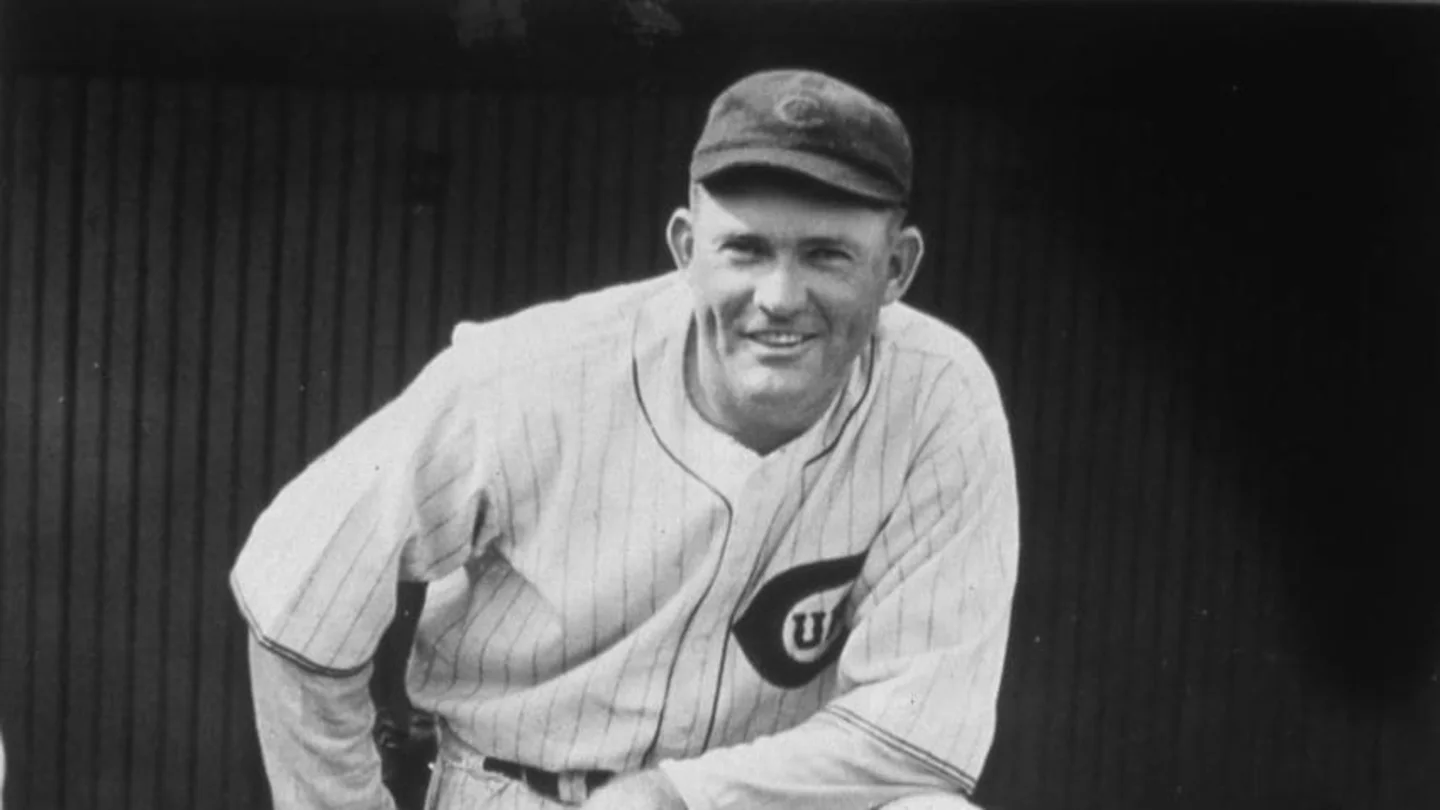
However, Hornsby’s career was not without its controversies. Known for his fiery personality and demanding nature, he often found himself at odds with teammates, management, and the press. Despite these conflicts, his undeniable talent and contributions to the game could not be overlooked. As a player-manager for the Cardinals, he led the team to its first World Series championship in 1926, cementing his legacy as one of the game’s great leaders.
Hornsby’s post-playing career included roles as a manager and coach, where he continued to influence the game and impart his knowledge to younger players. His election to the Baseball Hall of Fame in 1942 was a testament to his remarkable career and the lasting impact he had on Major League Baseball.
Rogers Hornsby’s Legacy
Rogers Hornsby’s legacy is that of a baseball titan, a player whose dedication to the art of hitting and competitive spirit made him a legend. His career serves as a bridge between the dead-ball and live-ball eras, showcasing his adaptability and dominance in both contexts. Hornsby’s story is a reminder of the relentless pursuit of excellence and the complex nature of sporting greatness.

As we continue to explore the lives and careers of baseball’s all-time greats, Hornsby’s story enriches our understanding of the game’s history and the individuals who have shaped it.
10. Lou Gehrig
Lou Gehrig, known as “The Iron Horse,” is one of the most revered figures in Major League Baseball history, embodying not only exceptional athletic prowess but also remarkable character and resilience. Born on June 19, 1903, in New York City, Gehrig’s career with the New York Yankees from 1923 to 1939 became a cornerstone of baseball lore, marked by his incredible durability, powerful hitting, and the grace with which he faced a career-ending illness.
Gehrig’s statistical achievements are staggering. He compiled 493 home runs, 1,995 RBIs (ranking him among the top in MLB history), and a .340 career batting average. He was twice named the American League’s Most Valuable Player and was a seven-time All-Star. Perhaps his most famous record was playing in 2,130 consecutive games, a testament to his durability and consistency, which stood for 56 years until it was broken by Cal Ripken Jr. in 1995.
Beyond the numbers, Gehrig’s legacy is profoundly shaped by his character and the circumstances surrounding his premature retirement. On July 4, 1939, Gehrig delivered his iconic “Luckiest Man” farewell speech at Yankee Stadium, after being diagnosed with amyotrophic lateral sclerosis (ALS), a disease that would later bear his name. His courage in the face of such adversity, and his gratitude even as his life and career were being cut short, left an indelible mark on the hearts of fans and on the game itself.
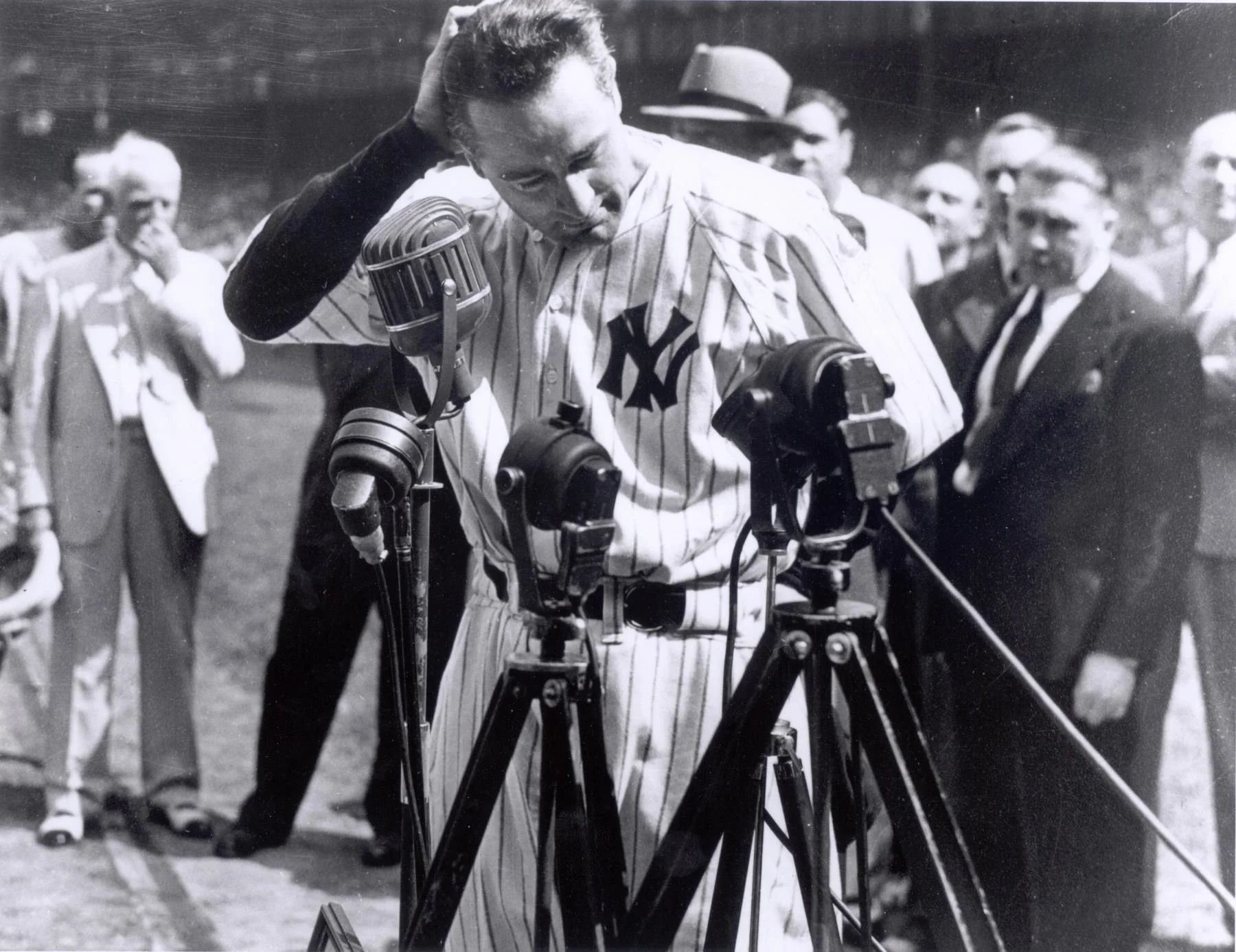
Gehrig’s impact on baseball extended beyond his playing days. He symbolized the ideal of the humble athlete, dedicated to his team and the sport over personal glory. His relationship with teammate Babe Ruth, though complex, was part of what made the Yankees of the 1920s and 1930s a legendary team. Gehrig’s presence in the lineup and his contributions to the Yankees’ dynasty helped shape the legacy of one of the most storied franchises in sports.
Inducted into the Baseball Hall of Fame in 1939 in a special election by the Baseball Writers’ Association of America, Gehrig’s place among the game’s greats was solidified not only by his on-field achievements but also by the dignity and courage with which he lived his life. The annual Lou Gehrig Day observed by MLB, inaugurated in 2021, serves as a testament to his enduring legacy, raising awareness for ALS and honoring his contributions to baseball and humanity.
Lou Gehrig’s story is a poignant reminder of the transcendent power of sports to inspire and unite. His legacy, marked by incredible athletic achievement, personal integrity, and the resilience to face life’s greatest challenges with grace, continues to inspire future generations. “The Iron Horse” remains a symbol of enduring strength, humility, and the indomitable human spirit.

As we conclude our exploration of the top 10 MLB players of all time, each athlete’s story has provided a unique window into the heart of baseball and its impact on American culture. From the sheer dominance of Babe Ruth to the resilience of Lou Gehrig, these legends have not only defined excellence within the sport but have also left a lasting legacy on the national consciousness.
Reflection and Final Thoughts
Baseball, with its rich history and deep connections to American life, offers more than just statistics and records; it provides stories of human triumph, perseverance, and the pursuit of excellence. The legends we’ve explored represent the pinnacle of the sport, but they also remind us of the enduring spirit of competition and the profound impact that sports can have on society.
As we reflect on the legacies of these baseball greats, we are reminded of the timeless appeal of the game and how it continues to inspire, challenge, and bring people together. The stories of these ten individuals are forever woven into the fabric of Major League Baseball, serving as enduring examples of what it means to strive for greatness, both on and off the field.









